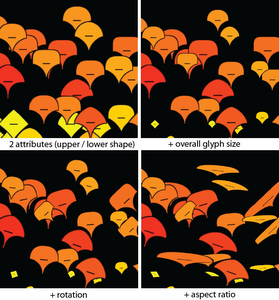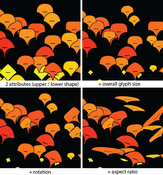Information
- Visibility: hidden
- Publication Type: Conference Paper
- Workgroup(s)/Project(s):
- Date: 2009
- Location: Budmerice, Slovakia
- Lecturer: Andreas E. Lie
- Booktitle: Proceedings of the Spring Conference on Computer Graphics (SCCG 2009)
- Pages: 27 – 34
Abstract
Glyphs are useful for the effective visualization of multi-variate data. They allow for easily relating multiple data attributes to each other in a coherent visualization approach. While the basic principle of glyph-based visualization has been known for a long time, scientific interest has recently increased focus on the question of how to achieve a clever and successful glyph design. Along this newer trend, we present a structured discussion of several critical design aspects of glyph-based visualization with a special focus on 3D data. For three consecutive steps of data mapping, glyph instantiation, and rendering, we identify a number of design considerations. We illustrate our discussion with a new glyph-based visualization of time-dependent 3D simulation data and demonstrate how effective results are achieved.Additional Files and Images
Weblinks
No further information available.BibTeX
@inproceedings{lie-2009-cri,
title = "Critical Design and Realization Aspects of Glyph-based 3D
Data Visualization",
author = "Andreas E. Lie and Johannes Kehrer and Helwig Hauser",
year = "2009",
abstract = "Glyphs are useful for the effective visualization of
multi-variate data. They allow for easily relating multiple
data attributes to each other in a coherent visualization
approach. While the basic principle of glyph-based
visualization has been known for a long time, scientific
interest has recently increased focus on the question of how
to achieve a clever and successful glyph design. Along this
newer trend, we present a structured discussion of several
critical design aspects of glyph-based visualization with a
special focus on 3D data. For three consecutive steps of
data mapping, glyph instantiation, and rendering, we
identify a number of design considerations. We illustrate
our discussion with a new glyph-based visualization of
time-dependent 3D simulation data and demonstrate how
effective results are achieved.",
location = "Budmerice, Slovakia",
booktitle = "Proceedings of the Spring Conference on Computer Graphics
(SCCG 2009)",
pages = "27--34",
URL = "https://www.cg.tuwien.ac.at/research/publications/2009/lie-2009-cri/",
}


